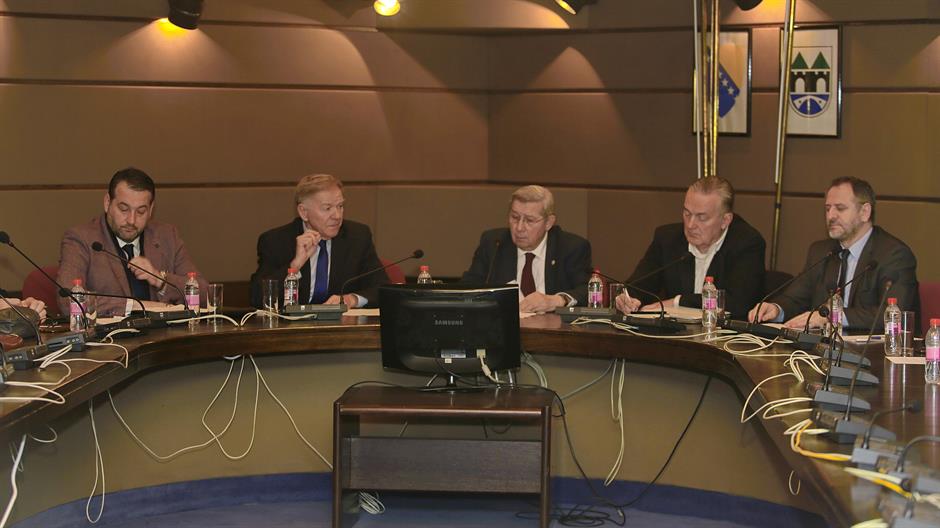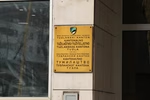
A ‘Declaration on the status of Croats in Bosnia and Herzegovina’ which Croatia’s Parliament adopted on Friday has sparked outrage in Bosnia, with political parties and intellectuals accusing the neighbouring country of breaching Bosnia’s sovereignty.
The Declaration calls for Bosnia to change its election law, so that ethnic Croats achieve equal rights in the country.
It was adopted with 81 votes in favour and 11 against it, while four lawmakers abstained.
The move is the latest in a campaign three former top officials in the country who used to oversee the implementation of 1995 Bosnia’s Dayton Peace Agreement said represents “meddling in the internal affairs” of Bosnia, which they also wrote in a letter to top EU officials.
The newly adopted document warns that Croats are marginalised in Bosnia.
A group of intellectuals gathered in Sarajevo on the same day to discuss the Declaration and announced they will put together an ‘Anti-declaration’ which would include their own view on the status of Bosnian Croats in the country.
The gathering was attended by, among others, former Bosnian Foreign Affairs Minister Zlatko Lagumdzija, wartime Bosnian Croat member of the country’s tripartite Presidency Ivo Komsic, wartime Parliament Speaker Miro Lazovic, and General Secretary of the Council of Congress of Bosniak Intellectuals, Emir Zlatar.
Bosnian citizens have “at the Referendum in 1992 chosen an independent, sovereign and integral state of Bosnia and Herzegovina, with all of its peoples and citizens equal,” their joint statement began.
Based on those principles and on Bosnia’s international recognition as a sovereign state, the same year a Platform of the Presidency of the Republic of Bosnia and Herzegovina was created, in order to defend the country, as confirmed by the 1995 Dayton Peace Agreement which was signed in Paris on this very day 23 years ago, they said.
“Today, 23 years later, on the territory which is under the political control of the SNSD and the HDZ, an ethnonational homogenisation was realised, dominantly influenced by the ruling politics in Belgrade and Zagreb,” their joint statement said, referring to the ethnic-oriented Croat Democratic Union (HDZ), a sister party of the one in power in Croatia, and the Alliance of Independent Social Democrats (SNSD), lead by hardline Bosnian Serb nationalist Milorad Dodik.
The forming of Bosnia’s Government following the October General Election has come into international focus “as the problem has been imposed as a political-security issue of the entire region,” the intellectuals said.
“From the past war and the aggression onward, there is continuous interference by the neighbouring countries in Bosnia’s internal issues. This has culminated recently and an image of Bosnia and Herzegovina as the main subject of the foreign policy of Serbia and Croatia is being created,” they said.
This has all been made even more difficult with the implementation of the election results, which the said political parties “interpret as it fits them.”
“Judging by some concrete moves of our neighbours, this serves as a reason to once again initiate the processes which were defeated during the war of the 1990s and which were prosecuted by international courts in the Hague,” they said.
Political groups in Bosnia “still condition the forming of the Government with their party goals,” they said.
Those parties who won in Bosnia’s Serb-dominated semi-autonomous entity of Republika Srpska (RS), announce “a further destruction” of the country and ”the strengthening” of the entities, while parties that won in the other entity, the Bosniak-Croat Federation (FBiH), are announcing “the further ethnicization” of Bosnia’s territory, according to the intellectuals.
“The end goal of such politics is: to show the domestic and the international public that Bosnia and Herzegovina is, as a state, unsustainable, unfunctional, undemocratic and irrational,” they said.
The group demanded that “domestic and EU authorities, the US administration, the High Representative and the Representative of the European Commission in Bosnia and Herzegovina,” completely implement the 1995 Dayton Peace Agreement, which ended the war and “which guarantees protection of the sovereignty of our country, its integrity, multiethnicity, protection of the equal rights of all its peoples and citizens, of its democracy and basic human rights.”
The main Bosniak ethnic-oriented political party in the country, the Party for Democratic Action (SDA), said that Croatia’s behaviour represents a “grave attempt to damage the sovereignty of Bosnia and Herzegovina.”
Bosnia’s laws can only be discussed by democratically elected officials in Bosnia, the party said, adding that instead of discussing Bosnia’s Election Law, Croatia should focus on fulfilling its obligations regarding prosecutions of war crimes, as requested by the Chief Prosecutor at the International Residual Mechanism for Criminal Tribunals (IRMCT).
IRMCT is the international court tasked with continuing the job of the International Criminal Tribunal for the Former Yugoslavia (ICTY), which closed its doors last year.
Only through respecting international law and order can Bosnia and Croatia build good neighbourly relations, the SDA said.
The Bosniak Presidency member from the party, Sefik Dzaferovic, said that Croatia is, with its Declaration, expressing disrespect for the sovereignty of Bosnia and its territorial integrity.
“As a signatory of the Dayton Peace Agreement, the Republic of Croatia is obligated to fully respect the sovereignty and territorial integrity of Bosnia and Herzegovina and refrain from any activities that would put those values in question,” Dzaferovic said, adding that Zagreb’s Friday Declaration was a violation of that Agreement.
He called upon Croatian officials to “reconsider” their relationship toward Bosnia.
“If this trend of interference in Bosnia and Herzegovina’s internal issues continues, and the trend of avoiding to resolve other open issues, such as the border, property and others, alienation in the relationship is inevitable,” he said, adding that that would be “contrary to the interests of both countries.”
Other, civic-oriented parties also reacted.
The Civic Alliance (GS) also condemned the move of Croatia’s Parliament, saying it represents the continuation of the wartime politics of former Croatian President Franjo Tudjman.
Tudjman and other Croatian top officials have been named by the ICTY as supporters of a 'joint criminal enterprise' in a verdict against six former Bosnian Croat top officials who were convicted of war crimes.
Kakvo je tvoje mišljenje o ovome?
Učestvuj u diskusiji ili pročitaj komentare





 Srbija
Srbija
 Hrvatska
Hrvatska
 Slovenija
Slovenija



























































